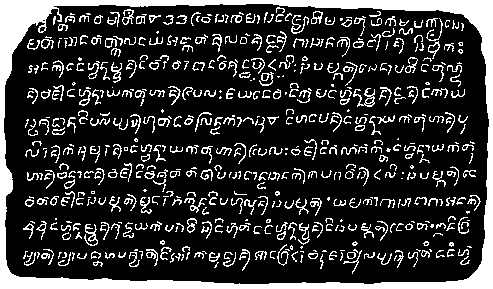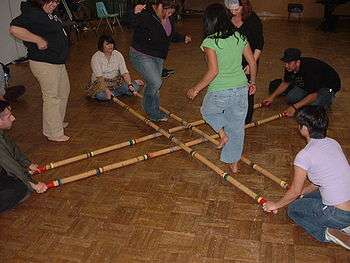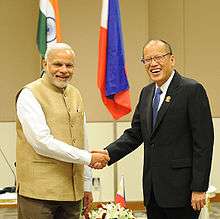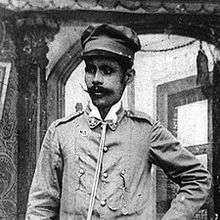List of India-related topics in the Philippines
 |
|
India |
Philippines |
|---|---|
| Diplomatic Mission | |
| Embassy of India[1] 2190 Paraiso, Makati, Metro Manila, Philippines Phone:+63 922 340 4676 Google map |
Embassy Of Philippines[2] 50-N Nyaya Marg, Chanakyapuri, New Delhi 110021, India Phone: +91 11 2611 0152 Google map |
| Envoy | |
| Ambassador Mr. Lalduhthlana Ralte | Ambassador Ms. Teresita C. Daza |
India and Philippines have historic ties going back over 3000 years and there are over 150,000 people of Indian origin in Philippines.[3]
Iron Age finds in the Philippines also point to the existence of trade between Tamil Nadu in South India and the Philippines Islands during the ninth and tenth centuries B.C.[4] The influence of Culture of India on Culture of the Philippines intensified from the 2nd through the late 14th centuries CE.[5]
The Indian-Filipinos are Philippine citizens of Indian descent. The NRI are Indian citizens living in Philippines.
This is an alphabetical list:
History
- Battle of Manila (1762) by the East India Company's Indian soldiers during Anglo-Spanish War (1761–63)
- Cainta in Rizal: historic settlement of Indians
- Golden Tara (Agusan image) is a golden statue that was found in Agusan del Sur
- Greater India includes Philippines and South East Asia.
- History of Indian influence on Southeast Asia
- Indian settlement in the Philippines
- Indianisation: Indian influence on other cultures
- Indosphere
- Kedatuan of Madja-as
- Kingdom of Butuan: Indianized kingdom in Philippines
- Laguna Copperplate Inscription, earliest known written document found in the Philippines, in Indianized Kawi script with Sanskrit loanwords
- Maritime Southeast Asia under the influence of Indosphere
- Majapahit: Indianized empire in Philippines and Indonesia
- Maynila (historical entity)
- Namayan
- Rajah Matanda (1480–1572), ruler of the Indianized Kingdom of Maynila, together with Rajah Sulayman and Lakan Dula, he was one of three kings that ruled parts of present-day Manila, and fought against the Spanish Empire's colonisation of the Philippines
- Rajah Sulayman (also Sulayman III, 1558–1575), Indianized Kingdom of Maynila
- Rajahnate of Cebu
- Srivijaya, Indianized empire in Philippines and Indonesia
- Sultanate of Maguindanao
- Sultanate of Lanao
- Sultanate of Sulu
- Tabon Caves Garuda Gold Pendant found in the Tabon caves in the island of Palawan, is an image of Garuda, the eagle bird who is the mount of Hindu deity Vishnu [6]
- Tondo (Historical State)
- Early industries in Philippines that were introduced from India include boat-building, metal works, weaving of cotton clothes and quicklime mining method
- Flowers and their Sanskrit names introduced to Philippines by the Indian traders during the ancient times include sampaguita and champaka
- Fruits and their Sanskrit names introduced to Philippines by the Indian traders during the ancient times include mango, nangka (Jackfruit) and sirisa
- Vegetables and their Sanskrit names introduced to Philippines by the Indian traders during the ancient times include ampalaya, patola and malunggay
Language
- Baybayin: ancient Filipino script based on Brahmic family of Indian script
- Indian loanwords in various Filipino languages
- Influence of Indian languages on Tagalog language
- Sanskrit language loanwords in Tagalog language
- Tamil language loanwords in Tagalog language
- Sanskrit language loanwords in Cebuano language
Sports
Filipino sports influenced by the Indian martial arts
- Filipino martial arts such as Kalis and others have been inspired by the Indian martial arts
Music
- Kudyapi, native Filipino guitar of Maranao, Manobo and Maguindanao people, is influenced by the Indian classical music concepts of melody and scale via Maritime Southeast Asia
Cultural traditions
- Filipino pre-colonial styles and titles are based on Indian Sanskrit tradition
- Sampaguita Filipino national flower is named from Indian Sanskrit Champaka
- National Assembly of the Philippines Hall has the statue of ancient Hindu saint Manu behind the president's seat with the inscription on its base: The first, the greatest and the wisest law-giver of mankind
- Placing a garland of fresh flowers around the neck of a visitor as a symbol of respect and hospitality
- Giving a dowry to the bride’s parents and rendering personal services in the household of his prospective parents-in-law
- The Pre-colonial Wedding customs based on Hindu wedding are still followed by Filipino, such as showering the groom and the bride with rice after the wedding ceremony
- Offering buyo mixture of betelnut, lime and ikmo leaf to a visitor as a sign of hospitality, this is Filipino version of Indian Paan
- Pilgrimage of a childless couple to a holy shrine whose deity is believed to have the power to grant their wish for a child
Epics and poems
Inspired by the Indian Hindu religious epics Ramayana and Mahabharta.
- Alim and Hudhud Oral traditions of Ifugao of Ifugao people of the Cordillera Administrative Region in Luzon island of Philippines, are based on the Indian Hindu epics Ramayana and Mahabharta, the Hudhud Chants of the Ifugao was chosen as one of the 11 Masterpieces of the Oral and Intangible Heritage of Humanity in 2001 and formally inscribed as a UNESCO Intangible Cultural Heritage in 2008
- Hudhud - the Ifugao epic based on the Indian epic Mahabharta
- Biag ni Lam-ang (English: "The Life of Lam-ang") is an epic poem of the Ilocano people from the Ilocos region of the Philippines based on the Indian Hindu epics Ramayana and Mahabharta
- Ibalong epic of Bikol region of Philippines, based on the Indian Hindu epics Ramayana and Mahabharta
- Singkil (Darangen) epic of Maranao people from Lake Lanao is based on the Indian Hindu epic Ramayana and Putri Gandingan is the Darangen name for Sita
Religion
- Buddhism in the Philippines
- Buddhism in Southeast Asia
- Hinduism in the Philippines
- Hinduism in Southeast Asia
- Religion in pre-colonial Philippines had Indianized Hindu and Buddhist influence
- Nanak Darbar Indian Sikh Temple, Iloilo
People
- List of Filipino-Indian people
- Indian surnames in Philippines
- Foreign citizens residing in Philippines, as pr 2011 census there were nearly 9000 Indian citizens living in Philippines
- Ethnic groups in the Philippines
- Josephine Acosta Pasricha, PhD (Indology) - Filipina Indologist married to an Indian
- Juan R. Francisco, PhD (Indology) - Filipino Indologist
- Filipinos in India
- Indian people
Business
- Business process outsourcing to India
- Business process outsourcing in the Philippines
- Indian Companies, some operate in Philippines also
- Murrah buffalo originally from the Central Institute for Research on Buffaloes, Hisar, Haryana, India was exported to Philippine Carabao Center in Nueva Ecija to improve the breed of Filipino carabao
- Maritime Southeast Asia under the influence of Indosphere
Politics and travel
- India–Philippines relations
- Visa requirements for Indian citizens
- Visa requirements for Filipino citizens
- Tourism in the Philippines
- Tourism in India
Gallery
-

Laguna Copperplate Inscription in Kawi script with Sanskrit loanwords
-

Dancers practising the steps of the Singkil epic of Maranao people from Lake Lanao
-
Murrah buffalo originally from Punjab and Haryana states of India was exported to Philippine Carabao Center in Nueva Ecija to improve the breed of Filipino carabao
-

Indian Prime Minister Narendra Modi and Philippine President Benigno Aquino III in Napyidaw, Myanmar (2014)
-

Pepe Diokno movie director and producer
-

Juan Cailles independence revolutionary


